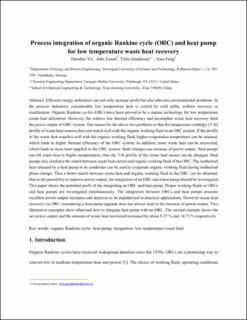| dc.contributor.author | Yu, Haoshui | |
| dc.contributor.author | Gundersen, Truls | |
| dc.contributor.author | Feng, Xiao | |
| dc.date.accessioned | 2020-03-25T10:37:13Z | |
| dc.date.available | 2020-03-25T10:37:13Z | |
| dc.date.created | 2018-11-26T20:14:10Z | |
| dc.date.issued | 2018 | |
| dc.identifier.citation | Energy. 2018, 160 330-340. | en_US |
| dc.identifier.issn | 0360-5442 | |
| dc.identifier.uri | https://hdl.handle.net/11250/2648536 | |
| dc.description.abstract | Organic Rankine cycles (ORCs) have been a mature technology for low temperature waste heat utilization. However, the relatively low thermal efficiency and incomplete waste heat recovery limit the power output of ORC systems. The reason for the above two problems is that the temperature-enthalpy (T-H) profile of waste heat sources does not match well with the organic working fluid in an ORC system. Heat pumps may reinforce the match between the waste heat carrier and the organic working fluid of the ORC. The condensation heat released by a heat pump can be used to evaporate the organic working fluid during phase change. Thus, a better thermal match between waste heat and the organic working fluid in the ORC can be obtained. Due to the possibility to improve power output, the integration of an ORC and a heat pump is investigated in this study. Proper working fluids in ORCs and heat pumps are chosen simultaneously. The integration between ORCs and heat pumps presents significant power output increases for special cases and deserves to be popularized in practical applications. However, the integrated system does not always lead to an increase in power output. The integration is profitable only when the following pre-conditions are satisfied simultaneously: (a) poor thermal match between working fluid and waste heat for standalone ORC; (b) the evaporation temperature of the ORC is set appropriately; (c) the working fluid of the ORC has a small ratio of latent to sensible heat; (d) the COP of the heat pump is satisfactory. A systematic procedure to determine the optimal operating conditions of the system is proposed in this study. A case study adopted from literature demonstrates the potential benefits of the integration of heat pumps and ORCs. The results show that the net power output and the amount of waste heat recovered increase by 9.37% and 12.04% respectively. | en_US |
| dc.language.iso | eng | en_US |
| dc.publisher | Elsevier | en_US |
| dc.rights | Attribution-NonCommercial-NoDerivatives 4.0 Internasjonal | * |
| dc.rights.uri | http://creativecommons.org/licenses/by-nc-nd/4.0/deed.no | * |
| dc.title | Process integration of organic Rankine cycle (ORC) and heat pump for low temperature waste heat recovery | en_US |
| dc.type | Peer reviewed | en_US |
| dc.type | Journal article | en_US |
| dc.description.version | acceptedVersion | en_US |
| dc.source.pagenumber | 330-340 | en_US |
| dc.source.volume | 160 | en_US |
| dc.source.journal | Energy | en_US |
| dc.identifier.doi | 10.1016/j.energy.2018.07.028 | |
| dc.identifier.cristin | 1635391 | |
| dc.relation.project | Norges forskningsråd: 257632 | en_US |
| dc.description.localcode | © 2018. This is the authors’ accepted and refereed manuscript to the article. Locked until 11.7.2020 due to copyright restrictions. This manuscript version is made available under the CC-BY-NC-ND 4.0 license http://creativecommons.org/licenses/by-nc-nd/4.0/ | en_US |
| cristin.unitcode | 194,64,25,0 | |
| cristin.unitname | Institutt for energi- og prosessteknikk | |
| cristin.ispublished | true | |
| cristin.fulltext | preprint | |
| cristin.qualitycode | 2 | |

